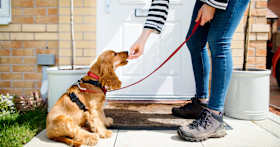by Kelly Villa, | February 7, 2024

Dog separation anxiety can be treated effectively, but it will not just go away on its own. In fact, if left untreated, the anxiety will become worse over time. Separation anxiety runs the gamut from mild to very severe. If you’re fortunate enough to be dealing with a mild case, talk to a vet or animal behaviorist as soon as possible to stop the anxiety from becoming worse.
How Do I Recognize Separation Anxiety?
Separation anxiety doesn’t just mean your dog misses you when you’re gone and stays stuck to you like glue when you’re home. In severe forms, dogs will actually injure themselves as they attempt to escape. Some of the signs that point to separation anxiety include:
Excessive Barking
Going to the bathroom in the house
Destructive chewing
Pacing
Escape attempts
Note that those behaviors can occur in a dog without separation anxiety. If these issues only occur when you’re gone, then it’s likely a form of separation anxiety.
Since you know that separation anxiety isn’t going to just go away on its own, you need to take action. While you can try DIY remedies like calming collars or playing classical music, such methods should be reserved for mild cases. If you don’t see immediate progress, talk to your vet.
If the anxiety is moderate to severe (i.e. includes destructive behavior and escaping) you should visit your vet or a highly qualified animal behaviorist as soon as possible to prevent your dog from harming themself.
The sooner you start treatment, the sooner you’ll no longer have to worry about the health and safety of your pet while you’re away.

Kelly Villa
Kelly Villa is a freelance writer and contributor to various pet publications.
Related articles

Behavior & Training
How Do You Treat A Dog With Anxiety?

Behavior & Training
Which Dog Breeds Have Separation Anxiety?

Behavior & Training
What Natural Remedy Can I Give My Dog For Anxiety?

Behavior & Training
Do Dogs Get Tired of Barking?
Why dogs bark, when it’s not normal, and how to curb this behavior.

Behavior & Training
What Are Signs of Anxiety In Dogs?

Behavior & Training
How Do You Calm A Stressed Dog?

Behavior & Training
How Long Does It Take a Dachshund to Get Used to a New Home?

Behavior & Training
Why Do Dogs Bite Their Pet Parents?

Behavior & Training
Why Is My Dog Suddenly Chewing Everything?

Behavior & Training
Why Do Dogs Chew Up Kleenex?

Behavior & Training
Potty Training 101: How to House Train Your Puppy
Make your pup a potty pro with these house training tips.

Behavior & Training